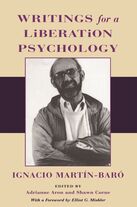
While oppression focuses on the forces of powers that inhibit things about a person or community, liberation speaks to the possibility of constructive change. To liberate is to reclaim and reposition in connection with others and the world around them. According to Castro and Afuape (2016) liberation is linked to “the transformative process of ‘conscientization’, in which we are both liberated and liberate, is dialectical, dialogical, relational and co-created. Therefore, no one person does the ‘liberating’. The development of critical consciousnesses is liberatory, as it creates space to reflect; be shaped by and shape the world and see new possibilities as creative ‘actors’ (rather than passive subjects) in our own experience.”
One of the fore-thinkers around a more liberational approach to psychotherapy was connected to Ignacio Martin-Baro. Drawing on Liberation Theology’s “preferential option for the poor,” Martin-Baro called on all of psychology—whether social, clinical, or educational—to stand on the side of the oppressed people of Latin America and join with them in the struggle for social justice (Gaztambide 2019). Inspired by Paulo Freire’s critical pedagogy, Martin-Baro collaborated with marginalized communities in El Salvador to develop research projects that empowered them to articulate their experience of political dislocation and develop a critical consciousness of how those experiences were related to oppressive power structures. Unfortunately, he was murdered by the government of El Salvador because of his dissident viewpoints and his access to communal power through his religious community.
Through his experiences, Martin-Baro developed ideas around how one can engage with Liberation Psychology through the following approaches, which have also been re-interpreted into applications for psychotherapy. They include:
- Recovering Historical Memory: Not just our personal narratives but narratives of other generations, of other parts of our culture.
- De-ideologizing of everyday experience: to reflect on the taken-for-granted assumptions about what counts as normal behavior, how these relate to wider discourses, whose agenda these discourses serve, as well as the effects of these ideas on therapeutic relationship.
- Conscientization’– critical consciousness, dialogue, and relationship. Knowing where one stands or what values navigate our interactions.
- Challenging Fatalismo (fatalism) – how do we challenge “it is what it is” states of mind
We invite all of our colleagues to think about how they may utilize some of these approaches in their work with young folks. Let’s start a discussion in our small groups and communities about whether these ideas feel helpful to the work that we do both on an individual and larger ecological scale.
Moving into Praxis:
- A video to highlight liberation-based work with trauma around racism, particularly the freeze response that may come up for our clients (below)
- From coping skills to empowerment/resistance skills: We are invited to think about this with our clients, to take some time to reflect on a client and identify what skills they currently use to cope with things, and to go a little further and think about what ways might be they may be able to better advocate for their sense of empowerment or resistance.
- Check out the works of Taiwo Afuape, Gillian Huges, Daniel Jose Gaztambide, Lara Sheehi, and Jennifer Mullan just to name a few.
Thank you for reading, and for the work you do!
 RSS Feed
RSS Feed